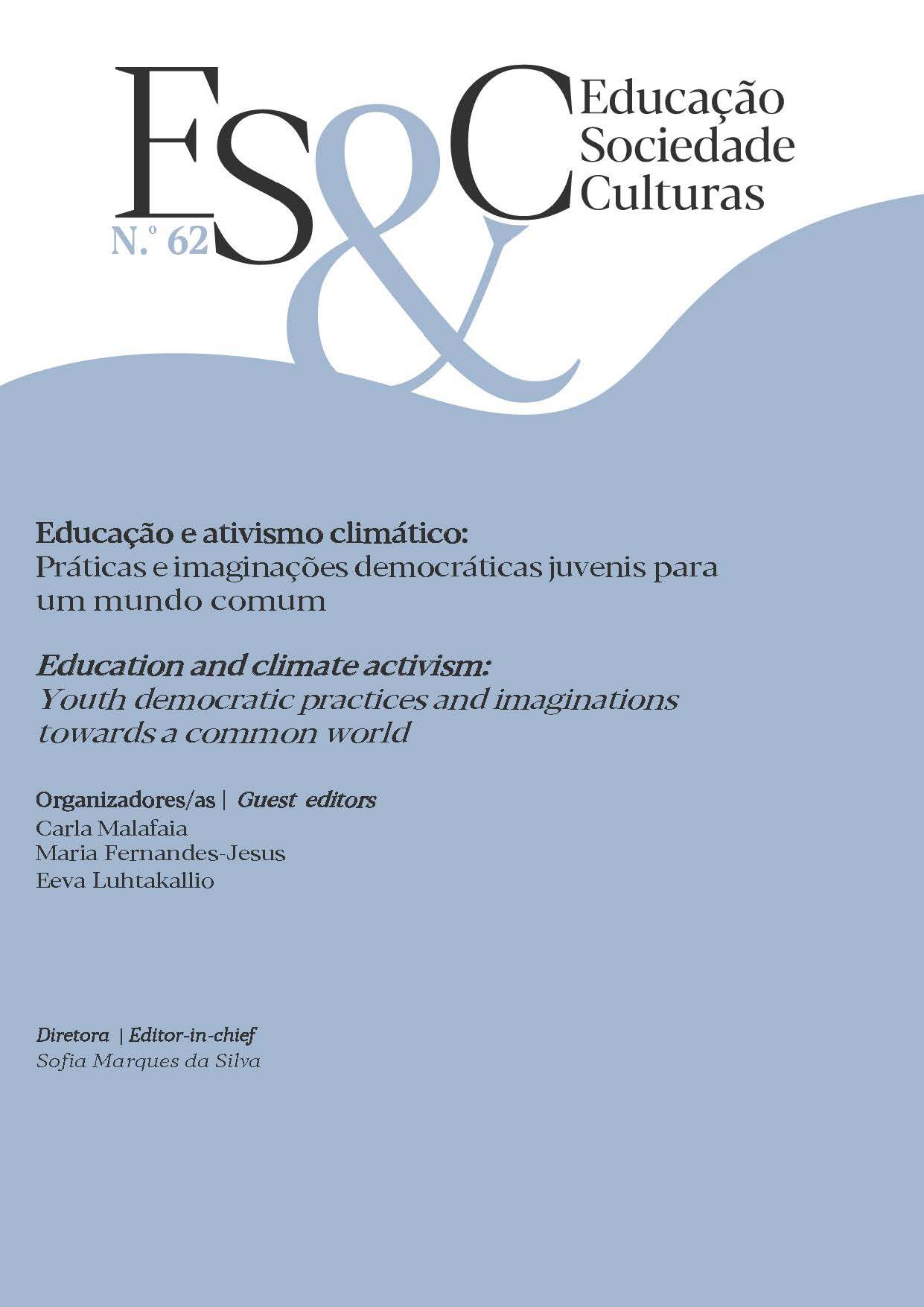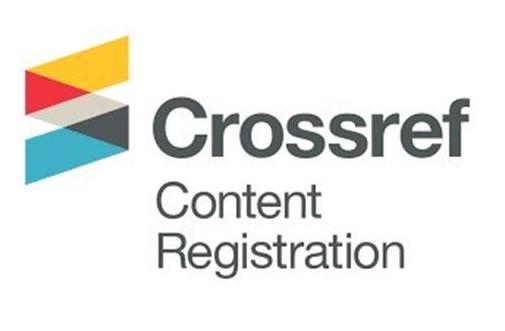Construção de significados pelas crianças sobre as alterações climáticas através do photovoice: Empoderar as crianças através de um processo participativo para aprenderem, cuidarem e agirem
Empoderar as crianças através de um processo participativo para aprenderem, cuidarem e agirem
DOI:
https://doi.org/10.24840/esc.vi62.478Palavras-chave:
children, climate change, participatory action research, photovoice, youthResumo
Recebido: 3/2/2022
Aceite: 2/7/2022
Downloads
Referências
Barrett, Aileen, Kajamaa, Anu, & Johnston, Jenny (2020). How to … be reflexive when conducting qualitative research. The Clinical Teacher, 17(1), 9-12. https://doi.org/10.1111/tct.13133
Beh, Adam, Bruyere, Brett, & Lolosoli, Sam (2013). Legitimizing local perspectives in conservation through community-based research: A photovoice study in Samburu, Kenya. Society and Natural Resources, 26(12), 1390-1406. https://doi.org/10.1080/08941920.2013.805858
Bentz, Julia (2020). Learning about climate change in, with and through art. Climatic Change, 162, 1595-1612. https://doi.org/10.1007/s10584-020-02804-4
Boys and Girls Clubs of America. (2021). At a glance fact sheet 2020. Boys and Girls Clubs of America. https://www.bgca.org/about-us/club-impact
Biswas, Tanu, & Mattheis, Nikolas (2022). Strikingly educational: A childist perspective on children’s civil disobedience for climate justice. Educational Philosophy and Theory, 54(2), 145-157. https://doi.org/10.1080/00131857.2021.1880390
Braun, Virginia, & Clarke, Victoria (2006). Using thematic analysis in psychology. Qualitative Research in Psychology, 3, 77-101. https://doi.org/10.1191/1478088706qp063oa
Cocco-Klein, Samantha, & Mauger, Beatrice (2018). Children’s leadership on climate change: What can we learn from child-led initiatives in the U.S. and the Pacific Islands? Youth and Environments, 28(1), 90-103. https://doi.org/10.7721/chilyoutenvi.28.1.0090
Collins, Patricia (2000). Black feminist thought: Knowledge, consciousness, and the politics of empowerment. Routledge.
Costa, Arthur, & Kallick, Bena (1993). Through the lens of a critical friend. Educational Leadership, 51(2), 49-51.
Creswell, John, & Poth, Cheryl (2018). Qualitative inquiry & research design: Choosing among five approaches (4th ed.). SAGE. https://doi.org/10.1017/CBO9781107415324.004
Cutter-Mackenzie, Amy, & Rousell, David (2019). Education for what? Shaping the field of climate change education with children and young people as co-researchers. Children’s Geographies, 17(1), 90-104. https://doi.org/10.1080/14733285.2018.1467556
Derr, Victoria, & Simons, Jordin (2020). A review of photovoice applications in environment, sustainability, and conservation contexts: Is the method maintaining its emancipatory intents? Environmental Education Research, 26(3), 359-380. https://doi.org/10.1080/13504622.2019.1693511
Dutta, Urmitapa (2016). Prioritizing the local in an era of globalization: A proposal for decentering community psychology. American Journal of Community Psychology, 58(3-4), 329-338. https://doi.org/10.1002/ajcp.12047
Faulkner, Dorothy (2016). Young children as storytellers: Collective meaning making and sociocultural transmission. In T. Cremin, R. Flewitt, B. Mardell, & J. Swann (Eds.), Storytelling in early childhood: Enriching language, literacy and classroom culture (pp. 85-100). Routledge. https://doi.org/https://doi.org/10.4324/9781315679426
Fisher, Scott (2016). Life trajectories of youth committing to climate activism. Environmental Education Research, 22(2), 229-247. https://doi.org/10.1080/13504622.2015.1007337
Guba, Egon (1982). ERIC / ECTJ annual review paper criteria for assessing the trustworthiness of naturalistic inquiries. Educational Communication and Technology, 29(4), 75-91. https://doi.org/10.1126/science.146.3642.347
Harris, John (2018). Vulnerable youth’s perspectives and priorities for informal settlements: Photovoice evidence from Lusaka, Zambia. Journal of Planning Education and Research, 38(4), 398-412. https://doi.org/10.1177/0739456X17709914
Heras, Maria, Tabara, J. David, & Meza, Amayrani (2016). Performing biospheric futures with younger generations: A case in the MAB Reserve of La Sepultura, Mexico. Ecology and Society, 21(2), 14. https://doi.org/10.5751/ES-08317-210214
Herrick, Imogen, Lawson, Michael, & Matewos, Ananya (2022). Through the eyes of a child: Exploring and engaging elementary students’ climate conceptions through photovoice. Educational and Developmental Psychologist, 39(1), 100-115. https://doi.org/10.1080/20590776.2021.2004862
Hickman, Caroline (2019). Children and climate change: Exploring children’s feelings about climate change using free association narrative interview methodology. In P. Hoggett (Ed.), Climate psychology: On indifference to disaster (pp. 41–59). Palgrave Macmillan. https://doi.org/10.1007/978-3-030-11741-2_3
Hickman, Caroline, Marks, Elizabeth, Pihkala, Panu, Clayton, Susan, Lewandowski, Eric, Mayall, Elouise, Wray, Britt, Mellor, Catriona, & van Susteren, Lise (2021). Climate anxiety in children and young people and their beliefs about government responses to climate change: A global survey. Lancet Planet Health, 5(12), E863-E873. https://doi.org/10.1016/S2542-5196(21)00278-3
Jensen, Bjarne, & Schnack, Karsten (2006). The action competence approach in environmental education. Environmental Education Research, 12(3-4), 471-486. https://doi.org/10.1080/13504620600943053
Jones, Charlotte, & Davison, Aidan (2020). Disempowering emotions: The role of educational experiences in social responses to climate change. Geoforum, 118, 190-200. https://doi.org/10.1016/j.geoforum.2020.11.006
Kukkonen, Tiina, & Chang-Kredl, Sandra (2018). Drawing as social play: Shared meaning-making in young children’s collective drawing activities. International Journal of Art and Design Education, 37(1), 74-87. https://doi.org/10.1111/JADE.12116
Lawson, Danielle, Stevenson, Kathryn, Peterson, Nils, Carrier, Sarah, Strnad, Renee, & Seekamp, Erin (2019). Children can foster climate change concern among their parents. Nature Climate Change, 9(6), 458-462. https://doi.org/10.1038/s41558-019-0463-3
Lopez, Flor, Wickson, Fern, & Hausner, Vera (2018). Finding creative voice: Applying arts-based research in the context of biodiversity conservation. Sustainability, 10(6), 1778. https://doi.org/10.3390/su10061778
McBride, Sarah, Hammond, Matthew, Sibley, Chris, & Milfont, Taciano (2021). Longitudinal relations between climate change concern and psychological wellbeing. Journal of Environmental Psychology, 78, 272-4944. https://doi.org/10.1016/j.jenvp.2021.101713
Monroe, Martha, Plate, Richard, Oxarart, Annie, Bowers, Alison, & Chaves, Willandia (2019). Identifying effective climate change education strategies: A systematic review of the research. Environmental Education Research, 25(6), 791-812. https://doi.org/10.1080/13504622.2017.1360842
Noonan, Robert, Boddy, Lynne, Fairclough, Stuart, & Knowles, Zoe (2016). Write, draw, show, and tell: A child-centred dual methodology to explore perceptions of out-of-school physical activity. BMC Public Health, 16, 326. https://doi.org/10.1186/s12889-016-3005-1
O’Brien, Karen, Selboe, Elin, & Hayward, Bronwyn (2018). Exploring youth activism on climate change: Dutiful, disruptive, and dangerous dissent. Ecology and Society, 23(3), 42. https://doi.org/10.5751/ES-10287-230342
Ojala, Maria (2020). To trust or not to trust? Young people’s trust in climate change science and implications for climate change engagement. Children’s Geographies, 19(3), 284-290. https://doi.org/10.1080/14733285.2020.1822516
Papenfuss, Jason, Merritt, Eileen, Manuel-Navarrete, David, Cloutier, Scott, & Eckard, Bonnie (2019). Interacting pedagogies: A review and framework for sustainability education. Journal of Sustainability Education, 20. http://susted.com/wordpress/wp-content/uploads/2019/04/Papenfuss-JSE-April-2019-General-Issue-PDF.pdf
Percy-Smith, Barry, & Burns, Danny (2013). Exploring the role of children and young people as agents of change in sustainable community development. Local Environment, 18(3), 323-339. https://doi.org/10.1080/13549839.2012.729565
Rooney-Varga, Juliette, Brisk, Angelica, Adams, Elizabeth, Shuldman, Mitchell, & Rath, Kenneth (2014). Student media production to meet challenges in climate change science education. Journal of Geoscience Education, 62(4), 598-608. https://doi.org/10.5408/13-050.1
Sipos, Yona, Battisti, Bryce, & Grimm, Kurt (2008). Achieving transformative sustainability learning: Engaging head, hands and heart. International Journal of Sustainability in Higher Education, 9(1), 68-86. https://doi.org/10.1108/14676370810842193
Sonn, Christopher (2016). Swampscott in international context: Expanding our ecology of knowledge. American Journal of Community Psychology, 58(3-4), 309-313. https://doi.org/10.1002/ajcp.12038
Stapleton, Sarah (2019). A case for climate justice education: American youth connecting to intragenerational climate injustice in Bangladesh. Environmental Education Research, 25(5), 732-750. https://doi.org/10.1080/13504622.2018.1472220
Sunrise Movement. (2020). Our plan for the Future: What is the green new deal? How you can help. Sunrise Movement. https://www.sunrisemovement.org/green-new-deal/
Sutton-Brown, Camille (2014). Photovoice: A methodological guide. Photography and Culture, 7(2), 169-185. https://doi.org/10.2752/175145214X13999922103165
Theobald, Maryanne, Danby, Susan, Einarsdóttir, Jóhanna, Bourne, Jane, Jones, Desley, Ross, Sharon, Knaggs, Helen, & Carter-Jones, Claire (2015). Children’s perspectives of play and learning for educational practice. Education Sciences, 5, 345-362. https://doi.org/10.3390/educsci5040345
Trott, Carlie (2019). Reshaping our world: Collaborating with children for community-based climate change action. Action Research, 17(1), 42-62. https://doi.org/10.1177/1476750319829209
Trott, Carlie (2020). Children’s constructive climate change engagement: Empowering awareness, agency, and action. Environmental Education Research, 26(4), 532-554. https://doi.org/10.1080/13504622.2019.1675594
Trott, Carlie (2021). Youth-led climate change action: Multi-level effects on children, families, and communities. Sustainability, 13(22), 12355. https://doi.org/10.3390/su132212355
Trott, Carlie, Even, Trevor, & Frame, Susan (2020). Merging the arts and sciences for collaborative sustainability action: A methodological framework. Sustainability Science, 15(4), 1067-1085. https://doi.org/10.1007/s11625-020-00798-7
Trott, Carlie, Rockett, Maria, Gray, Emmanuel-Sathya, Lam, Stephanie, Even, Trevor, & Frame, Susan (2020). “Another Haiti starting from the youth”: Integrating the arts and sciences for empowering youth climate action in Jacmel, Haiti. Community Psychology in Global Perspective, 6(2/2), 48-70. http://siba-ese.unisalento.it/index.php/cpgp/article/view/21951
Trott, Carlie, & Weinberg, Andrea (2020). Science education for sustainability: Strengthening children’s science engagement through climate change learning and action. Sustainability, 12(16), 6400. https://doi.org/https://doi.org/10.3390/su12166400
UNICEF. (2021). The climate crisis is a child rights crisis. UNICEF. https://www.unicef.org/reports/climate-crisis-child-rights-crisis?s=03
Vásquez, Olga (2006). A pedagogy of the future. Pedagogies: An International Journal, 1(1), 43-48. https://doi.org/10.1207/s15544818ped0101_7
Wang, Caroline, & Burris, Mary (1997). Photovoice: Concept, methodology, and use for participatory needs assessment. Health Education and Behavior, 24(3), 369-387. https://doi.org/10.1177/109019819702400309
Downloads
Publicado
Como Citar
Edição
Secção
Licença
Direitos de Autor (c) 2022 Stephanie Lam

Este trabalho encontra-se publicado com a Licença Internacional Creative Commons Atribuição-NãoComercial-CompartilhaIgual 4.0.
Os/as autores/as mantêm os direitos autorais, sem restrições, e concedem à revista ESC o direito de primeira publicação, com o trabalho simultaneamente licenciado sob a Creative Commons Atribuição-NãoComercial-CompartilhaIgual 4.0 Internacional (CC BY-NC-SA). É permitido copiar, transformar e distribuir e adaptar o material em qualquer suporte ou formato, desde que com o devido reconhecimento da autoria e publicação inicial nesta revista, as alterações sejam identificadas e seja aplicada a mesma licença ao material derivado, não podendo ser usado para fins comerciais.









